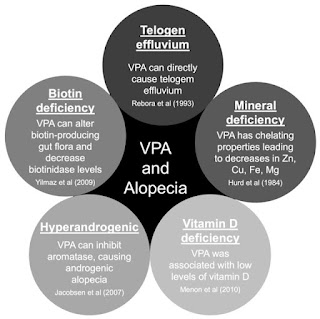Article type: Systematic Review
Article title: Antiseizure Medication-Induced Alopecia: A Literature Review
Journal: Medicines
Year: 2023
Authors: Jamir Pitton Rissardo, Ana Letícia Fornari Caprara, Maritsa Casares, Holly J. Skinner, Umair Hamid
E-mail: jamirrissardo@gmail.com
ABSTRACT
Background: Adverse effects of antiseizure medications (ASMs) remain one of the major causes of non-adherence. Cosmetic side effects (CSEs) are among the most commonly reported side effects of ASMs. In this context, alopecia is one of the CSEs that has a high intolerance rate leading to poor therapeutical compliance. Methods: We performed a literature review concerning alopecia as a secondary effect of ASMs. Results: There are 1656 individuals reported with ASM-induced alopecia. Valproate (983), lamotrigine (355), and carbamazepine (225) have been extensively reported. Other ASMs associated with alopecia were cenobamate (18), levetiracetam (14), topiramate (13), lacosamide (7), vigabatrin (6), phenobarbital (5), gabapentin (5), phenytoin (4), pregabalin (4), eslicarbazepine (3), brivaracetam (2), clobazam (2), perampanel (2), trimethadione (2), rufinamide (2), zonisamide (2), primidone (1), and tiagabine (1). There were no reports of oxcarbazepine and felbamate with drug-induced alopecia. Hair loss seen with ASMs was diffuse and non-scarring. Telogen effluvium was the most common cause of alopecia. A characteristic feature was the reversibility of alopecia after ASM dose adjustment. Conclusions: Alopecia should be considered one important adverse effect of ASMs. Patients reporting hair loss with ASM therapy should be further investigated, and specialist consultation is recommended.
Keywords: alopecia; hair loss; cosmetic side effects; antiseizure medication; anticonvulsant
Full text available at:
DOI
10.3390/medicines10060035
Citation
Pitton Rissardo, J.; Fornari Caprara, A.L.; Casares, M.; Skinner, H.J.; Hamid, U. Antiseizure Medication-Induced Alopecia: A Literature Review. Medicines 2023, 10, 35.
Figure 1. Flowchart of the screening process.
Figure 2. Pathophysiology of valproate-induced alopecia. Abbreviations: Cu, copper; Mg, magnesium; VPA, valproate/valproic acid; Zn, zinc.


